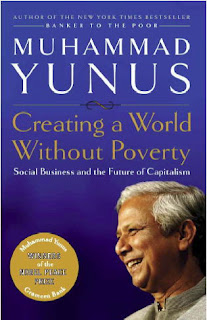Until date Bangladesh has her only one outstanding personage to be proud of his global honour of being conferred the prestigious Nobel Prize: Professor Dr. Muhammad Yunus, the third Bengali on earth. Humiliating him despite worldwide remonstration will be tantamount to disgracing the nation. During the Bangladesh Liberation War in 1971 , Dr. Yunus founded a citizen's committee and ran the Bangladesh Information Centre, with other Bangladeshis living in the United States, to raise support for liberation and published the Bangladesh Newsletter in Nashville. The 1974 famine left deep imprint on him (in the Bangladesh Genocide Archive, John Pilger reported that "possibly over a million people died in the 1974 famine in Bangladesh from July 1974 to January 1975 , although the Bangladesh government claimed only 26 ,000 people died"). He became involved with poverty reduction, established a rural economic programme as a research project called Nabajug. Later on he sowed the seed of Grameen Bank, his dream project, at Zobra village in Chittagong, which has spread its light in the USA, Europe and as many as 40 other countries. The Grameen owners and their beneficiaries now account for about one-third of the Bangladeshis. More than three decades following the long-awaited Victory Day of 16 December as the culmination of our Liberation War in 1971 , Professor Dr. Muhammad Yunus brought his motherland Bangladesh another Victory Day by winning the Nobel Prize for Peace 2006 for his Grameen Bank (GB) model of poverty alleviation-an intractable task to relieve the ultra-poor from the vicious circle of poverty. In the chequered history of this Nation replete with scores of gloomy and depressing phases of turmoil, malevolent strives, despicable disorder and horrendous anarchy, like a whiff of fresh summer breeze has happened the rare event of splendid glory for this small country but a big nation of about 150 million people, distinctly elevating her to a great height. Loans to poor people without any financial security or collateral had appeared to be "an impossible idea". From modest beginnings three decades ago, Yunus has, first and foremost through Grameen Bank, developed micro-credit into an ever more important instrument in the struggle against poverty. Grameen Bank (GB) has been a source of ideas and models for many institutions in the field of micro-credit that have sprung up around the world. At a very depressing time - when the country was passing through a dense fog of dark uncertainty characterised by diseased and debilitating dog-eat-dog, petty self-interest, ruthlessness, infantile squabbling, using vitriolic diatribes, harbouring abominable corruption and terrorism, frenzied ferocity, grave uncertainty, spine chilling apprehension of brutal violence and thirsting after rivals' blood, and in a word a near-civil war situation in 2006 tacitly endorsed by a section of depraved civil society leaders - the Nobel Peace Prize for a son of this soil had come as a refreshing, rejuvenating sunshine; a rebirth, so to speak. GB's founder, known as the banker to the poorest of the poor, realised that hunger engenders anger resulting in social destabilisation, which pernicious trend can be halted by means of providing opportunity for self- employment to the poor. But no conventional bank had any micro- credit scheme without collateral, which a hardcore poor cannot offer. Thus began the journey of GB. True, economists like Galbraith, Samir Amin, Amartya Sen and others have extensively worked to find the causes and effects of poverty and its concomitants; but none really came up with a practical technique to emancipate the underdogs from the consumptive trap, as did Yunus. Here lies his uniqueness. As a repeatedly told lie by vile elements -- ganged up to mudslinging with ulterior motive -- does not become the truth, albeit may confuse a section of body politic. Agitprop, the agitation and propaganda scheme a la the early Soviets, reminiscent of Goeblsean design of misinformation/ disinformation usually end in whimper. All truth passes through three stages. First, it is ridiculed. Second, it is violently opposed. Third, it is accepted as being self- evident. This was Schopenhauer's observation. Truth is the best vindication against slander. Politicians and governments will come and go but Yunus and his ideal will live on forever. And as axiomatic facts last so truth cannot be rendered into untruth.

